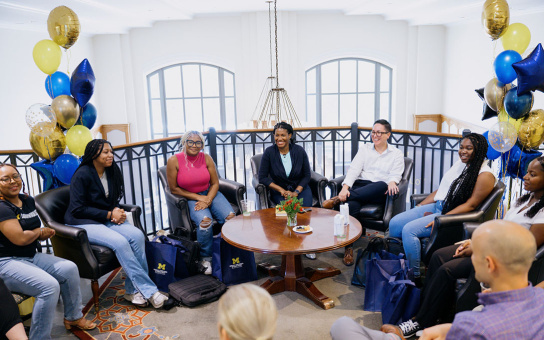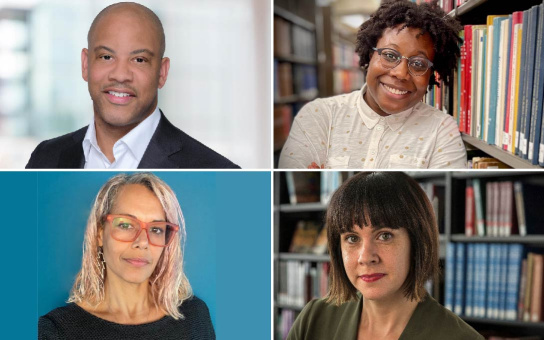DEI current work
What are we working on now?
Updated October 2023
Sharpening our focus
The DEI coalition meets regularly to review the Ford School's planned activities in the DEI strategic plan and to identify issues and propose new activities, initiatives, and organizational changes around four areas of focus:
- International student success
- Disability & accessibility
- Gender & sexuality
- Mental health & wellbeing
Enhancing our curriculum
We support our faculty in their efforts to incorporate an explicit understanding of structural racism and the historical role that policy has played both in building inequality and pursuing equality. This includes the further building of a clearinghouse with a wide variety of faculty resources (i.e., sample course assignments, multimedia material, conceptual models, theories, frameworks, glossary of terminology). Some of the Ford School's new courses in the 2023-24 academic year include:
- Kamissa Camara, the former Foreign Minister of Mali, teaches Great Power Rivalry and the International Order.
- Kristina Fullerton-Rico teaches Latinx Policy Perspectives and Social Movements in the U.S.
- Yousif Hassan joins the Ford School in Winter 2024 and will teach a course on the relationship between race, digital technology, and technoscientific capitalism.
- Mo Torres will teach Race, Place, and Inequality in Winter 2024.

Expanding our outreach
We’re strongly committed to strengthening important initiatives to increase diversity in public policy. Our summer 2023 pilot Applied Social Policy Internship and Research Experience (ASPIRE) program provided hands-on experience to four outstanding Spelman students interested in social science research. We are now working to expand the initiative's reach to collaborations with additional outstanding schools for next summer.
Creating space for discourse and healing
This semester we are supporting CommuniTea, a student-led series of informal, bi-weekly gatherings on key topics of interest. These gatherings offer a space for open dialogue, reflection, and healing among students. The topics will range from local and national policy issues to global concerns, and the discussions will be shaped by our student organization leaders with the support of the DEI team.

Cultivating a diverse community of changemakers

The Ford School's Center for Racial Justice visiting fellows will host a Racial Justice in Practice Workshop in Winter 2024. The visiting fellows program offers racial justice leaders, activists, artists, advocates, and scholars a prestigious, highly competitive fellowship designed to recognize their transformative work to date and provide opportunities to strengthen their impact within the policy landscape.
- Dr. Moya Z. Bailey, an associate professor at Northwestern is working on a three-part documentary series that investigates the experiences of Black women providers, patients, and advocates within the United States healthcare system, and to propose new policies and protocols addressing deep disparities in care.
- Dr. Angela S. García, associate professor at the University of Chicago’s Crown Family School of Social Work, Policy, and Practice, is working on her second monograph that centers the temporal dimensions of “illegality” and stems from the recognition that time is an irreplaceable form of human capital.
- Dr. Clarence Wardell III, senior program officer on the Economic Mobility and Opportunity team at the Bill & Melinda Gates Foundation, will further a co-authored monograph that leverages their experiences designing and leading key elements of the Biden-Harris Administration’s equity initiatives, as well as developing policy case studies that examine key aspects of the Administration’s historic efforts to advance racial equity.
- Diane J. Wright is a biracial, invisibly disabled Canadian-American filmmaker, author, and disability advocate of Afro-Caribbean descent. Her book manuscript meaningfully connects her disability justice work with the history of the African Diaspora to create an interwoven, detailed view of how and why Black autistic lives continue to be overlooked, underserved, misunderstood, persecuted, institutionalized, incarcerated, murdered, and systemically erased.